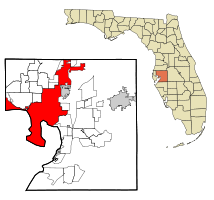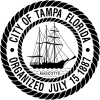Tampa, Florida, USA
| Tampa, Florida | |||
|---|---|---|---|
| City | |||
| City of Tampa | |||

Images from top, left to right: Skyline of Downtown Tampa, Amalie Arena, Ybor City, Henry B. Plant Museum, Raymond James Stadium, Busch Gardens Tampa
|
|||
|
|||
| Nickname(s): Cigar City,The Big Guava | |||
 Location in Hillsborough County and the state of Florida |
|||
| Location in the United States | |||
| Coordinates: 27°58′05″N 82°28′35″W / 27.96806°N 82.47639°WCoordinates: 27°58′05″N 82°28′35″W / 27.96806°N 82.47639°W | |||
| Country |
|
||
| State |
|
||
| County |
|
||
| Settled | 1823 | ||
| Incorporated (Village) | January 18, 1849 | ||
| Incorporated (Town) | September 10, 1853 and August 11, 1873 |
||
| Incorporated (City) | December 15, 1855 * and July 15, 1887 |
||
| Government | |||
| • Type | Mayor-council | ||
| • Mayor | Bob Buckhorn (D) | ||
| • Legislative | Tampa City Council | ||
| Area | |||
| • City | 175.22 sq mi (453.81 km2) | ||
| • Land | 113.42 sq mi (293.75 km2) | ||
| • Water | 61.80 sq mi (160.06 km2) 35.3% | ||
| • Urban | 802.3 sq mi (2,078 km2) | ||
| • Metro | 2,554 sq mi (6,610 km2) | ||
| Elevation | 48 ft (14.6 m) | ||
| Population (2010) | |||
| • City | 335,709 | ||
| • Estimate (2016) | 377,165 | ||
| • Rank | 53rd in the US | ||
| • Density | 3,325.47/sq mi (1,283.97/km2) | ||
| • Urban | 2.4 million (17th) | ||
| • Metro | 3,068,511 | ||
| Demonym(s) | Tampanian, Tampan | ||
| Time zone | EST (UTC-5) | ||
| • Summer (DST) | EDT (UTC-4) | ||
| ZIP codes | 33601–33626, 33629–33631, 33633–33635, 33637, 33646, 33647, 33650, 33655, 33660–33664, 33672–33675, 33677, 33679–33682, 33684–33689, 33694 | ||
| Area code(s) | 813 | ||
| FIPS code | 12-71000 | ||
| GNIS feature ID | 0292005 | ||
| Website | www |
||
| * Original city charter revoked by Florida Legislature on October 4, 1869 | |||
Tampa (/ˈtæmpə/) is a major city in, and the county seat of, Hillsborough County, Florida, United States. It is located on the west coast of Florida on Tampa Bay, near the Gulf of Mexico, and is the largest city in the Tampa Bay Area. The city had a population of 335,709 at the 2010 census, and an estimated population of 377,165 in 2016.
Archaeological evidence indicates that the shores of Tampa Bay were inhabited by indigenous peoples for thousands of years. The Safety Harbor culture developed in the area around the year 1000 AD, and the descendant and Pohoy chiefdoms were living in or near the current city limits of Tampa when the area was first visited by Spanish explorers in the 16th century. Interactions between native peoples and the Spanish were brief and often violent, and although the newcomers did not stay for long, they introduced European diseases which brought the total collapse of native societies across the entire Florida peninsula over the ensuing decades. Although Spain claimed all of Florida and beyond as part of New Spain, it did not found a colony on the west coast. After the disappearance of the indigenous populations, there were no permanent settlements in the Tampa Bay area until after the United States acquired Florida from Spain in 1821.
In 1824, the United States Army established a frontier outpost called Fort Brooke at the mouth of the Hillsborough River, near the site of today's Tampa Convention Center downtown. The first civilian residents were pioneer ranchers and farmers who settled near the fort for protection from the nearby Seminole population.
...
Wikipedia



